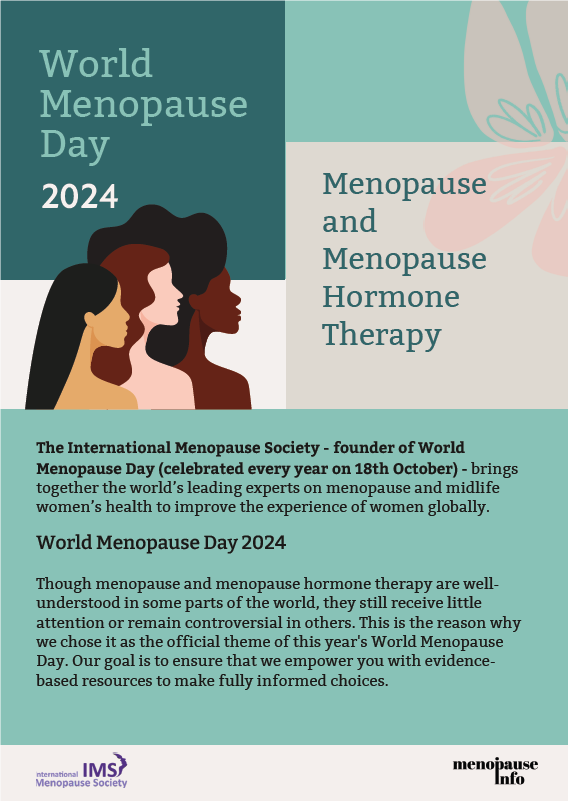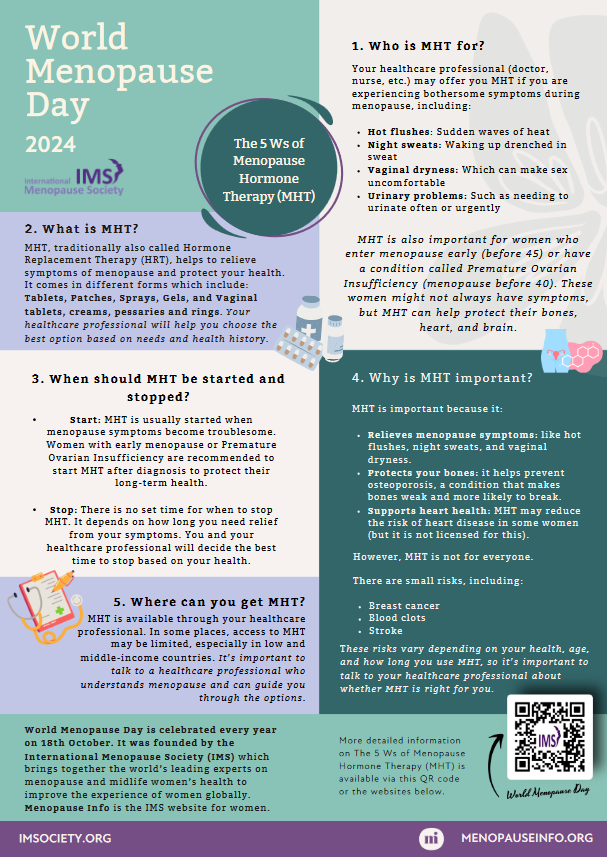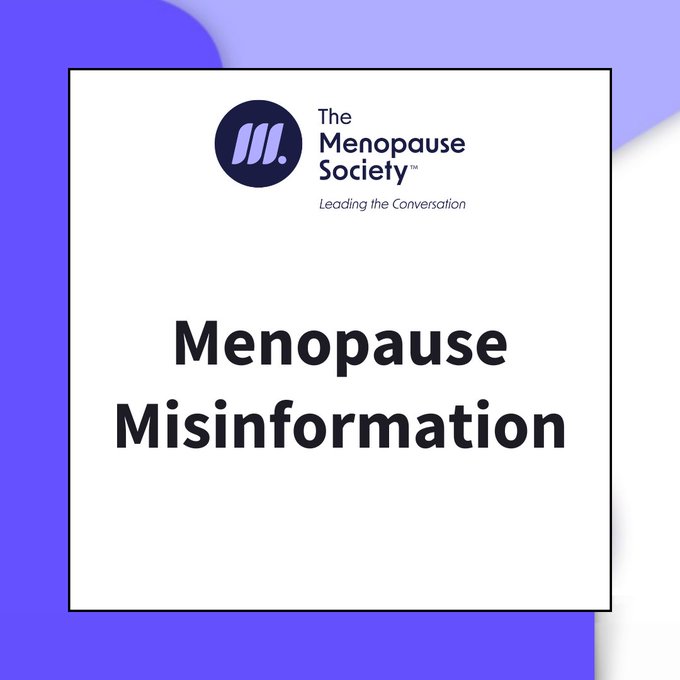“Hormone therapy remains first-line therapy
for management of bothersome vasomotor symptoms,
and the benefits typically outweigh the risks for…”.1
Umbrella
What may the Hormone Therapy Umbrella include?
Depending on the Source (DotS) this Umbrella may include:
- Hormone (Replacement) Therapy H(R)T
- Hormone Medicines
- Hormone Replacement Therapy (HRT)
- Hormone Therapy (HT)
- Hormones
- Medicines for Hormone Replacement Therapy
- Menopausal Hormone Therapy (MHT)
- Menopause Hormone Medicines
- Menopause Medicines
Date
What can it be important to be clear about with hormone therapy (HT) information?
It can be important to be clear about the date of all information including the date of HT information, because this information may have been updated.
Symptoms or Chronic Conditions
What can it also be important to be clear about with HT information?
It can also be important to be clear about whether HT information is about the use of HT for the management of menopausal symptoms such as hot flushes, night sweats and vaginal dryness or for the prevention of chronic conditions such as cardiovascular disease, cancer and osteoporosis.
Definition
What is hormone therapy (HT)?
DotS the definition of HT may vary. In Menopause Management Options: Menopausal Hormone Therapy (MHT) – What Is MHT? the (Australian) Jean Hailes for Women’s Health (JH) definition is:
 “Menopausal hormone therapy (MHT), formerly known as hormone replacement therapy (HRT), helps manage menopausal symptoms when they interfere with your life. Menopausal symptoms are caused by lowering levels of oestrogen hormones. MHT is the medical replacement of female hormones oestrogen and progesterone, and sometimes testosterone”.2
“Menopausal hormone therapy (MHT), formerly known as hormone replacement therapy (HRT), helps manage menopausal symptoms when they interfere with your life. Menopausal symptoms are caused by lowering levels of oestrogen hormones. MHT is the medical replacement of female hormones oestrogen and progesterone, and sometimes testosterone”.2
In Hormone Replacement Therapy (HRT): About Hormone Replacement Therapy (HRT) the (United Kingdom) NHS’s definition is:
“Hormone replacement therapy (HRT) is a treatment used to help menopause symptoms. It replaces the hormones oestrogen and progesterone, which fall to low levels as you approach the menopause”.3
In Glossary of Terms: Menopausal Hormone Therapy (MHT) Hormone Replacement Therapy (HRT)/ Hormone Therapy (HT) the Australasian Menopause Society’s (AMS) definition is:
Menopausal Hormone Therapy (MHT) is the term for what was formerly referred to as Hormone Replacement Therapy (HRT)”.4
In Hormone Therapy the Menopause Society’s (formerly the North American Menopause Society) definition is:
“Hormone therapies (HT), sometimes mistakenly called hormone replacement therapy, are the prescription drugs used most often to treat menopause symptoms such as hot flashes and genitourinary syndrome of menopause (GSM), which includes vaginal dryness after menopause”.5
 On page four of Menopause and Menopause Hormone Therapy: 2. What Is MHT? the International Menopause Society’s (IMS) Leaflet for Women for World Menopause Day 2024, the IMS’s definition is:
On page four of Menopause and Menopause Hormone Therapy: 2. What Is MHT? the International Menopause Society’s (IMS) Leaflet for Women for World Menopause Day 2024, the IMS’s definition is:
- Estrogen: The main hormone used in MHT. It helps reduce hot flushes, night sweats, and vaginal dryness
- Progesterone: This is given to women who still have a uterus (womb). It helps protect the womb lining from growing too much when taking estrogen”.6
5 Ws of Menopause Hormone Therapy
What is the IMS’s The 5 Ws of Menopause Hormone Therapy?
 In World Menopause Day 2024: The 5 Ws of Menopause Hormone Therapy (MHT) the IMS elaborate on:
In World Menopause Day 2024: The 5 Ws of Menopause Hormone Therapy (MHT) the IMS elaborate on:
- “Who is MHT for?
- What is MHT?
- When should MHT be started and stopped?
- Why is MHT important?
- Where can you get MHT?”7
Contraceptive or Not
Is HT a contraceptive?
No. On page four in Contraception for the Older Woman: Hormone Replacement Therapy the (British) Women’s Health Concern (WHC) note:
“It is important to realise that HRT is not a method of contraception”.8
Effective or Not
How effective is HT?
On page one in The Menopause Society Statement on Misinformation Surrounding Hormone Therapy: Indications for the Use of Hormone Therapy, published October 2024, the Menopause Society note:
Hormone therapy is indicated for the treatment of bothersome vasomotor symptoms,
genitourinary syndrome of menopause, primary ovarian insufficiency, and prevention of bone loss and reduction of fracture risk”.9
In The 2023 Practitioner’s Toolkit for Managing Menopause: Management – Considerations for All Women At Menopause: Menopausal Hormone Therapy, published online 30 October 2023, the authors explain:
What is VMS?
VMS can be an abbreviation for Vasomotor Symptoms such as hot flushes and night sweats.
Types
Are there different types of HT?
Yes. In HRT: Which HRT? the WHC explain:
There are over 50 different combinations of HRT currently available. Most women will make their choice whether to take HRT, and which form of HRT to take, with the help of their doctor”.11
Dose and Duration
What does the (United States) Food and Drug Administration (FDA) note about deciding to use HT?
In Menopause: Hormone Therapy – What Is Hormone Therapy for Menopause? the FDA note:
Benefits and Risks
What are the benefits and risks of HT?
In Menopause: Diagnosis & Treatment – Treatment the (United States) Mayo Clinic explain:
“Before deciding on any form of treatment, talk with your healthcare professional about your choices and the risks and benefits of each. Review your choices yearly. Your needs and the treatment choices may change”.13
In Hormone Therapy: Frequently Asked Questions – Who Should Not Use Hormone Therapy? the Menopause Society note:
“Hormone therapy is not a good choice for every woman. For some, the risks outweigh the benefits, so careful consideration with a healthcare professional is advised. In general, women who have breast cancer, uterine cancer, unexplained uterine bleeding, liver disease, a history of blood clots, and cardiovascular disease should not use hormone therapy”.14
In Hormone Replacement Therapy (HRT): Benefits and Risks of Hormone Replacement Therapy (HRT) the NHS note:
If you’re under 60 years old, have menopause symptoms, and are not at high risk of breast cancer or blood clots, the benefits of HRT are likely to outweigh the risks.
Talk to a GP, who will help you decide”.15
Who is a GP?
DotS and DotC (Depending on the Country) a GP may be a qualified and registered general practitioner, a medical practitioner, a medical doctor or a doctor.
Health Care Provider
What if I to choose to use HT?
The JH explain:
Health Topics A-Z
Where may I find Health Topics A-Z related to Hormone Therapy?
In Health Topics A-Z you may find:
Health Topics A-Z
- Hormone Therapy 2022 Update for Chronic Conditions
- Hormone Therapy Benefits and Risks
- Hormone Therapy Postmenopause
- Hormone Therapy Risks
- Hormone Therapy Types
- Hormone Therapy Videos
- Hormone Therapy and Estrogen Plus Progestogen Therapy
- Hormone Therapy and Estrogen Therapy
- Hormone Therapy and Tibolone
- Menopause Videos 2025
Links
Where may I find Links related to Hormone Therapy?
Your Country may have Links similar to:
Links
This Links List to third party websites is neither comprehensive nor exhaustive. Inclusion on this Links List does not imply endorsement or recommendation. Non-inclusion on this Links List does not imply non-endorsement or non-recommendation. Third party websites are not under the control of Meno Martha International Menopause Directory. Third party websites may contain explicit medical images and/or sexual references. Please read Meno Martha International Menopause Directory’s Links Policy before proceeding to a Link. Please contact Webmaster if you experience a problem with a Link.New or Updated
- Can HRT Stop Your Periods? [10 March 2025]
- Deciding About Hormone Therapy Use [February 2025]
- HRT, Misinformation and Navigating the Menopause Media Minefield With Kaye Adams [16 June 2025]
- Practical HRT Tips | Dr Louise Newson [13 April 2025]
- Slynd As Endometrial Protection [16 April 2025]
- When MS Meets Menopause: Is It Time To Rethink HRT? [30 May 2025]
New or Updated: NICE Guideline [National Institute for Health and Care Excellence]
[07 November 2024]
- HRT and the Likelihood of Some Medical Conditions. A Discussion Aid for GPs and Patients. Menopause: Identification and Management (NICE Guideline NG23) [07 November 2024]
- Menopause: Identification and Management [NICE Guideline Published: 12 November 2015 Last Updated: 07 November 2024]

- Menopause: Identification and Management: NICE Guideline [NG23] [07 November 2024]
- Summary of BMS Response To NICE Menopause Guidance [08 November 2024]
- Updated 2024 NICE Menopause Guidance Summary [08 November 2024]
- Updated Menopause Guidance Includes Discussion Aid To Support Conversations About HRT [07 November 2024]
New or Updated: World Menopause Day [18 October 2024]
- Video & Podcast Library: Videos – World Menopause Day 2024: Menopause and Hormone Therapy: Current Perspectives and Controversies [18 October 2024]
- Videos & Podcasts: Videos – Menopause and Hormone Therapy: Current Perspectives and Controversies [18 October 2024]
 World Menopause Day 2024: Leaflet for Women – Menopause and Menopause Hormone Therapy [Multiply Languages]
World Menopause Day 2024: Leaflet for Women – Menopause and Menopause Hormone Therapy [Multiply Languages]- World Menopause Day 2024: Poster for Women – The 5 Ws of Menopause Hormone Therapy (MHT)
- World Menopause Day 2024: The IMS White Paper: Menopause and MHT In 2024: Addressing the Key Controversies [Multiply Languages]
- AMS Statement 15 July 2024 [Australasian Menopause Society]
- BMS TV: HRT and Bleeding
- BMS TV: HRT and Breast Cancer: Overall Risks and Benefits
- BMS TV: HRT and the Risk of Breast Cancer
- BMS TV: Hormone Replacement Therapy (HRT)
- British Menopause Society Statement Published In Response To the BBC One Panorama Programme 30 September 2024
- British Menopause Society Statement on HRT Dosages [06 November 2024]
- Bioidentical Hormones: Are They Safer?
- Black Menopausal Women Almost 5 Times Less Likely To Be on HRT Than White Women
- Can HRT Stop Your Periods?
- Can Hormone Replacement Therapy Prevent Menopause Brain Changes?
- Can You Have HRT If You Are Overweight?
- Can You Have HRT With Uterine Fibroids
- Consumer Video and Podcast Series: 2023 Consumer Videos and Podcasts – Lifestyle Modification and Prevention of Breast Cancer
- Consumer Video and Podcast Series: 2024 Consumer Videos and Podcasts – Preparing for Your Menopause Health Care Visit
- Contraception for the Older Woman: Hormone Replacement Therapy
- Custom-Mixed Hormone Therapies Misleading Menopausal Women To Think Personalised Products Are Necessary, Experts Say
- Deciding About Hormone Therapy
- Deciding About Hormone Therapy Use
- Does Hormone Replacement Therapy Cause Cancer?
- EMAS On-Demand Webinars [European Menopause and Andropause Society] [Multiply Languages]: Impact of Estrogen Deficiency on Quality of Life In Asia and the Role of Continuous Combined MHT In Treatment (EN)
- Epilepsy the Menopause and HRT
- Experts Answer Your Menopause Questions In New Video
- FAQs: Hormone Therapy for Menopause
- Find A Menopause Practitioner [United States and Other]
- Find An AMS Member [Australasian Menopause Society i.e. Australia and New Zealand]
- Find Your Nearest BMS Menopause Specialist [British Menopause Society]
- From Cardiovascular Protection To Cardiovascular Risk: The Metamorphosis of Menopausal Hormone Therapy
- Genitourinary Syndrome of Menopause
- HRT
- HRT Questions Answered
- HRT and the Likelihood of Some Medical Conditions. A Discussion Aid for GPs and Patients. Menopause: Identification and Management (NICE Guideline NG23)
- HRT – Types, Doses and Regimens
- HRT, Misinformation and Navigating the Menopause Media Minefield With Kaye Adams [16 June 2025]
- HRT: Benefits and Risks
- HRT: The History
- Hormone Replacement Therapy
- Hormone Replacement Therapy (HRT)
- Hormone Replacement Therapy (HRT): Benefits and Risks of Hormone Replacement Therapy (HRT)
- Hormone Replacement Therapy (HRT): Continuous Combined Hormone Replacement Therapy (HRT) Tablets, Capsules and Patches
- Hormone Replacement Therapy (HRT): Sequential Combined Hormone Replacement Therapy (HRT) Tablets and Patches
- Hormone Replacement Therapy (HRT): Tibolone
- Hormone Replacement Therapy (HRT): Types of Hormone Replacement Therapy (HRT)
- Hormone Replacement Therapy (HRT): Vaginal Oestrogen
- Hormone Therapy
- Hormone Therapy In Postmenopausal Persons: Primary Prevention of Chronic Conditions
- Hormone Therapy and Biological Aging In Postmenopausal Women
- Hormone Therapy for Menopause Symptoms
- Hormone Therapy: Four Things A Mayo Clinic Women’s Health Specialist Wants You To Know [+ Video Courtesy: Mayo Clinic News Network. Name Super/CG: Taryn Smith, M.D./Internal Medicine/Mayo Clinic]
- Hormone Therapy: Is It Right for You?
- Is It Time To Revisit the Recommendations for Initiation of Menopausal Hormone Therapy?
- Is It Too Late To Start HRT?
- Joint BMS BSGE BGCS FSRH GIRFT and RCOG Guideline on Management of Unscheduled Bleeding on HRT
- Joint BMS FSRH RCGP RCOG SfE and RCN Women’s Health Forum Safety Alert
- Joint Position Statement by the British Menopause Society, Royal College of Obstetricians and Gynaecologists and Society for Endocrinology on Best Practice Recommendations for the Care of Women Experiencing the Menopause
- Later Years (Around 50 Years and Over): Menopause and Post Menopause Health – Hormone Replacement Therapy (HRT) [+ Video: Is HRT Bad for You?] [Other Languages and Formats]
- Long-Term Cognitive Effects of Menopausal Hormone Therapy: Findings From the KEEPS Continuation Study
- Management of Unscheduled Bleeding on Hormone Replacement Therapy (HRT)
- Mayo Clinic Q and A: Coping With Menopause: Can Hormone Therapy Help?
- Menopausal Hormone Therapy
- Menopausal Hormone Therapy and Breast Cancer Risk
- Menopausal Hormone Therapy and Venous Thromboembolism
- Menopausal Hormone Therapy, Heart Disease and Stroke
- Menopause
- Menopause Hormone Therapy: Does It Cause Vaginal Bleeding?
- Menopause Management Options: Menopausal Hormone Therapy (MHT)
- Menopause Map: Downloadable Resources – My Personal Path Print Tools: Questions for Your Health Care Provider

- Menopause Patient Information [Videos] 3. The Risks & Benefits of HRT
- Menopause Patient Information [Videos] 4. The Different Types of HRT
- Menopause Treatment Options After Cancer
- Menopause and HRT [Breast Cancer Risk]
- Menopause and HRT: Fact and Fiction
- Menopause: Identification and Management NICE Guideline Published: 12 November 2015 Last Updated: 07 November 2024]

- Menopause: Identification and Management: NICE Guideline [NG23] [07 November 2024]
- Menopause: Understanding the Changes and Finding Relief | Dr Susan Davis | The Proof Podcast EP 256
- Misinformation Surrounding Hormone Therapy [2024]
- Navigating Menopause: Expert Insights and Solutions | Dr Susan Davis | The Proof Podcast EP 245 [Video]
- Ongoing Individualized Hormone Therapy Appears To Have No Age Limit
- Practical HRT Tips | Dr Louise Newson
- Shedding Light on the Menopause Experience and Demystifying Treatment
- Subcutaneous Hormone Implant Therapy
- Slynd As Endometrial Protection
- The 2022 Hormone Therapy Position Statement of The North American Menopause Society
- The 2023 Practitioner’s Toolkit for Managing Menopause
- The Debate About Hormone Replacement Therapy During Menopause In MS: Rhonda R. Voskuhl, MD
- The Menopause Society Statement on Misinformation Surrounding Hormone Therapy

- The Women’s Health Initiative Randomized Trials and Clinical Practice
- The Women’s Health Initiative Trials: Clinical Messages
- Update on Menopause Hormone Therapy; Current Indications and Unanswered Questions
- Update – Subcutaneous Hormone Implant Therapy
- Updated 2024 NICE Menopause Guidance Summary
- Updated BMS Guidelines on Unscheduled Bleeding on HRT [Video]
- VIDEO: Hormone Therapy Protects Bone, Heart, Brain Health During Menopause
- Video & Podcast Library: Videos – World Menopause Day 2024: Menopause and Hormone Therapy: Current Perspectives and Controversies
- Videos & Podcasts: Videos – Menopause and Hormone Therapy: Current Perspectives and Controversies
- Videos and Podcasts: Videos – The Women’s Health Initiative – What Can We Believe?
- What Are the Most Common Symptoms of Menopause? And Which Can Hormone Therapy Treat?
- What Types of Vaginal Oestrogens Are There?
- World Menopause Day 2024: Leaflet for Women – Menopause and Menopause Hormone Therapy [Multiply Languages]
- World Menopause Day 2024: Poster for Women – The 5 Ws of Menopause Hormone Therapy (MHT)
 World Menopause Day 2024: The IMS White Paper: Menopause and MHT In 2024: Addressing the Key Controversies [Multiply Languages]
World Menopause Day 2024: The IMS White Paper: Menopause and MHT In 2024: Addressing the Key Controversies [Multiply Languages]
Sources
Where may I find the Sources quoted?
You may find the Sources quoted at:
Sources
- The Menopause Society Statement on Misinformation Surrounding Hormone Therapy: Indications for the Use of Hormone Therapy. 2024:1. Menopause Society https://menopause.org/wp-content/uploads/2024/09/TMS-statement-on-HT-Misinformation.pdf Accessed: 02 January 2025
- Menopause Management Options: Menopausal Hormone Therapy (MHT) – What Is MHT? Last Updated: 03 December 2024 | Last Reviewed: 19 August 2022. Jean Hailes for Women’s Health https://jeanhailes.org.au/health-a-z/menopause/menopause-management Accessed: 02 January 2025
- Hormone Replacement Therapy (HRT): About Hormone Replacement Therapy (HRT). Page Last Reviewed: 07 February 2023. NHS https://www.nhs.uk/medicines/hormone-replacement-therapy-hrt/about-hormone-replacement-therapy-hrt/ Accessed: 02 January 2025
- Glossary of Terms: Menopausal Hormone Therapy (MHT) Hormone Replacement Therapy (HRT)/Hormone Therapy (HT). Content Updated: February 2022. Australasian Menopause Society’s https://www.menopause.org.au/hp/information-sheets/381-glossary-of-terms Accessed: 02 January 2025
- Hormone Therapy. Menopause Society https://menopause.org/patient-education/menopause-topics/hormone-therapy Accessed: 02 January 2025
- Menopause and Menopause Hormone Therapy: 2. What Is MHT? 2024:4. International Menopause Society https://www.imsociety.org/wp-content/uploads/2024/10/2024-WMD-Leaflet_English.pdf Accessed: 02 January 2025
- World Menopause Day 2024. 2024. International Menopause Society https://www.imsociety.org/wp-content/uploads/2024/10/2024-WMD-Leaflet_English.pdf Accessed: 02 January 2025
- Contraception for the Older Woman: Hormone Replacement Therapy. Updated: November 2022:4. British Women’s Health Concern https://www.womens-health-concern.org/help-and-advice/factsheets/contraception-older-woman/ Accessed: 02 January 2025
- The Menopause Society Statement on Misinformation Surrounding Hormone Therapy: Indications for the Use of Hormone Therapy. 2024:1. Menopause Society https://menopause.org/wp-content/uploads/2024/09/TMS-statement-on-HT-Misinformation.pdf Accessed: 02 January 2025
- Davis, S. R., Taylor, S., Hemachandra, C., Magraith, K., Ebeling, P. R., Jane, F., and Islam, R. M. The 2023 Practitioner’s Toolkit for Managing Menopause: Management – Considerations for All Women At Menopause: Menopausal Hormone Therapy First Published Online: 30 October 2023 https://www.tandfonline.com/doi/full/10.1080/13697137.2023.2258783 Accessed: 02 January 2025
- HRT: Which HRT? Publication Date: November 2021. Women’s Health Concern https://www.womens-health-concern.org/help-and-advice/factsheets/hrt/ Accessed: 02 January 2025
- Menopause: Hormone Therapy – What Is Hormone Therapy for Menopause? Content Current As of: 14 December 2023. Food and Drug Administration https://www.fda.gov/ForConsumers/ByAudience/ForWomen/WomensHealthTopics/ucm117978.htm Accessed: 02 January 2025
- Menopause: Diagnosis & Treatment – Treatment. 07 August 2024. Mayo Clinic https://www.mayoclinic.org/diseases-conditions/menopause/diagnosis-treatment/drc-20353401 Accessed: 02 January 2025
- Hormone Therapy: Frequently Asked Questions – Who Should Not Use Hormone Therapy? 2024. Menopause Society https://menopause.org/patient-education/menopause-topics/hormone-therapy Accessed: 02 January 2025
- Hormone Replacement Therapy (HRT): Benefits and Risks of Hormone Replacement Therapy (HRT). Page Last Reviewed: 08 February 2023. NHS https://www.nhs.uk/medicines/hormone-replacement-therapy-hrt/benefits-and-risks-of-hormone-replacement-therapy-hrt/ Accessed: 02 January 2025
- Menopause Management Options: Menopausal Hormone Therapy (MHT) – How Long Do You Need To Take MHT? Last Updated: 03 December 2024 | Last Reviewed: 19 August 2022. Jean Hailes for Women’s Health https://jeanhailes.org.au/health-a-z/menopause/menopause-management Accessed: 02 January 2025








